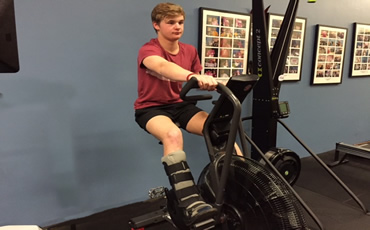Active kids are happier and healthier, enjoying the physical, emotional and psychological benefits of exercise and sport. They are motivated to train and improve their performance and these aspects have a positive impact on their lifestyle and wellbeing.
The one thing that will often disrupt their lives is injury. A minor injury can simply disrupt their training, but a significant injury will have a larger impact. Teaching them how to manage illness, injuries and setbacks is crucial. As a parent it is essential to get the right advice on how to recognize and manage physical and emotional issues in our kids and teenagers.
Teenagers may be reluctant to admit that they are not feeling great because they don’t want to miss training or competition. In this situation a niggling soft tissue injury can result in a major injury that will put them out for an extended period of time.
When a major injury occurs athletes are vulnerable and they need the right guidance, treatment and rehabilitation to get them back on track. Injury can create emotional and psychological issues in athletes, they can often feel helpless and isolated, increasing the risks of anxiety and depression.
Having the right support network in place is crucial. Early diagnosis and treatment will have a major impact on injury management and a timely return to sport. High quality sports medicine is readily available so make sure you are open to sourcing the best options for your athlete. Sports injuries require specialist care, and a treatment plan from a sports physician, physiotherapist, osteopath and other allied health professionals will have the best outcomes.
There's a lot of pressure on junior athletes, particularly if they show early talent. This pressure can come from parents, teachers and coaches, all keen to encourage them to succeed. Elite level performance is a long process and unfortunately we see too many young athletes fail to reach their potential due to injury and burnout.
Here are the 5 key ways to prevent this.
1. Focus on wellbeing. Encourage them to understand the importance of exercise, nutrition, hydration, sleep and mental health. Finding the right balance will maximize their performance.
2. Avoid early sport specialization. Keep variety in their sports and activities which will facilitate a more wholistic approach to their development. Focusing on a single activity from a young age increases the risk of overuse injuries which can be avoided.
3. Communication. Provide support and open communication with your athlete, allowing them every opportunity to tell you how they are feeling. It’s also important to encourage them to be open and honest with their coaches. A great coach will always have the best interests of their athletes as the top priority.
4. Teamwork. Even in an individual sport the champions have a support network in place that facilitates their performance. For a junior athlete this can include parents, coaches, peers and allied health professionals. Getting the right advice from the right person can make all the difference.
5. Balance. Even for a junior champion there is more to life than sport. Injuries and setbacks can occur for many reasons, and provide opportunities to learn and improve.
As a parent or coach, managing an injured athlete can be difficult. They will often feel down, resentful or maybe even angry, lashing out at those around them. Providing them with support, understanding and treatment will get them back on track. Whilst an injury may at first appear catastrophic to the athlete, they need to understand that there are ways to move forward and opportunities to improve their performance following treatment and rehabilitation. Stay positive.

